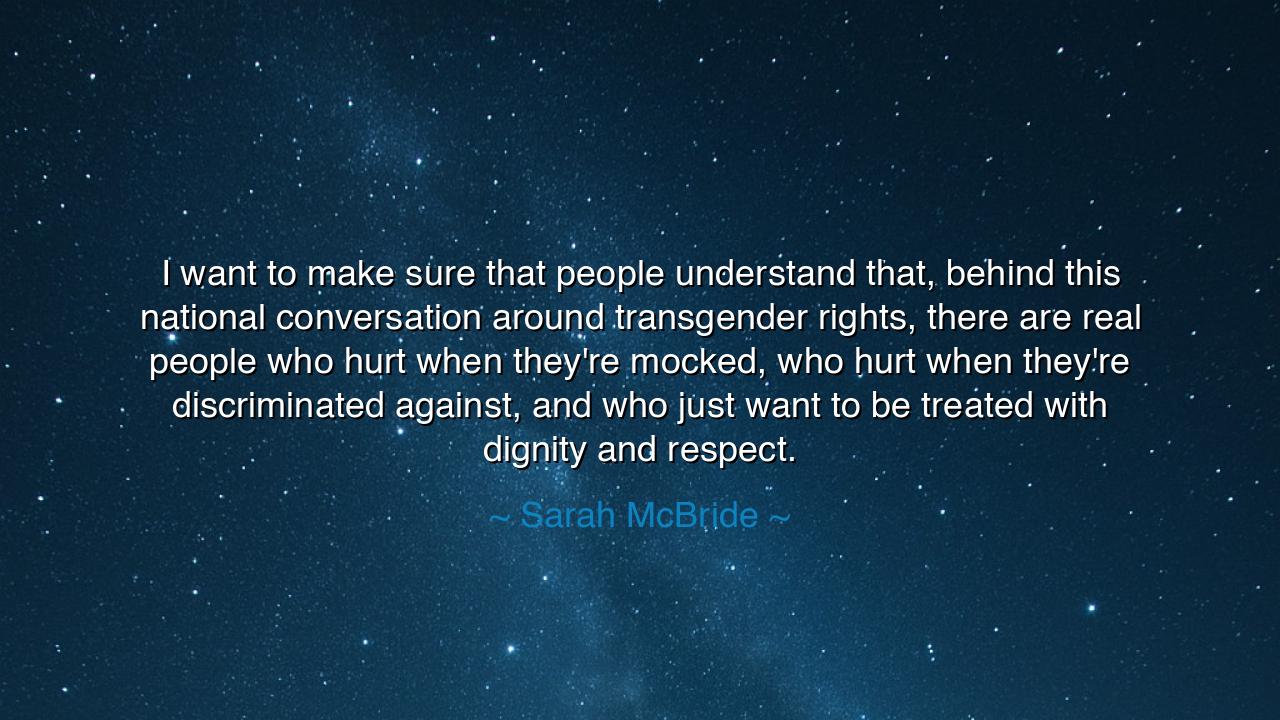
I want to make sure that people understand that, behind this
I want to make sure that people understand that, behind this national conversation around transgender rights, there are real people who hurt when they're mocked, who hurt when they're discriminated against, and who just want to be treated with dignity and respect.






Hear the words of Sarah McBride, spoken with the weight of compassion and the fire of truth: “I want to make sure that people understand that, behind this national conversation around transgender rights, there are real people who hurt when they are mocked, who hurt when they are discriminated against, and who just want to be treated with dignity and respect.” These words are not merely political utterances; they are a cry from the heart, reminding us that behind every debate, behind every law, behind every headline, there is a living soul whose tears, joys, and struggles are as sacred as our own.
From the earliest times, societies have faltered when they forgot the humanity of the marginalized. The ancients often deified power and scorned the weak, yet their sages and prophets lifted their voices to defend the oppressed. The Hebrew prophets cried out against injustice, declaring that to mock or wound the vulnerable was to wound the divine itself. McBride’s words echo this timeless wisdom: that every human being, whatever their journey or identity, is deserving of dignity.
Consider the story of Rosa Parks, who in 1955 refused to yield her bus seat in Montgomery. Behind that single act of defiance was a lifetime of indignity, a system that mocked and discriminated. Her quiet courage awakened a nation, reminding people that those who are oppressed are not abstractions but flesh-and-blood souls who suffer daily. In the same way, McBride calls us to see beyond abstract arguments about rights, and to recognize the lived experience of individuals who seek nothing more than the simple grace of being treated with respect.
The meaning of her words cuts to the core of empathy. Too often, debates reduce people to categories, stripping them of their humanity. But McBride reminds us: when you mock, someone bleeds inside; when you exclude, someone is left in isolation; when you discriminate, someone’s chance to live fully is diminished. It is not merely “policy” at stake—it is life itself, carried within fragile and sacred beings who ask only to walk in the world with dignity.
The lesson here is both noble and urgent: to speak and act with compassion in the presence of difference. Dignity is not a privilege to be granted selectively, but a birthright carried by all. The way we treat those most vulnerable among us defines the soul of a society more than any monument, law, or victory. To honor the humanity of the marginalized is to strengthen the very foundation of justice, for justice without empathy is a hollow shell.
Let us, then, commit ourselves to practical action. When you hear mockery, counter it with kindness. When you see discrimination, stand against it with courage. When you encounter someone whose path is unlike your own, greet them not with suspicion, but with openness. These are not small deeds; they are the bricks of a better world. By living this way, we embody McBride’s plea, transforming lofty ideals into daily acts of compassion.
Therefore, O listener, remember this truth: behind every debate and every struggle stand real people, yearning to be seen, to be honored, to be respected. Their pain is not abstract, their dignity is not negotiable, their worth is infinite. Stand with them, as the wise have always stood with the oppressed, and you will help weave a world where respect and dignity are not rare gifts, but the common air all may breathe.






AAdministratorAdministrator
Welcome, honored guests. Please leave a comment, we will respond soon